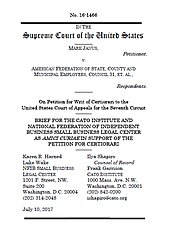Janus v. American Federation of State, County, and Municipal Employees
Learn more about Cato’s Amicus Briefs Program.
Illinois law mandates that non-union public-sector workers like Mark Janus pay money for union collective-bargaining activities that they do not support. Collective bargaining in the public-sector often involves advocacy of quintessentially political questions, such as the amount of public worker wages, pensions, and other benefits that will be paid for with the public’s tax money. Thus, these government-compelled exactions—“agency fees”—give these workers a Hobson’s choice: Either sacrifice your First Amendment rights and fund political advocacy you may not like, or find other employment. The Supreme Court upheld the constitutionality of these fees in Abood v. Detroit Board of Education (1977), but has since questioned Abood’s reasoning in Knox v. SEIU (2012) and Harris v. Quinn (2014). Two terms ago, the Court in Friedrichs v. California Teachers Association (2016) seemed primed to overrule Abood, but the untimely passing of Justice Antonin Scalia left the Court to split 4–4 on the question. This case deals with the same question that was presented in Friedrichs: Should Abood be overruled and public-sector agency-fee arrangements be declared unconstitutional? Following the Abood precedent, a federal district court understandably dismissed Janus’s case, which ruling the U.S. Court of Appeals for the Seventh Circuit quickly upheld. Cato and the National Federation of Independent Business Small Business Legal Center are now supporting Janus in petitioning the Supreme Court to reconsider Abood once again. We focus on the embedded issue of whetherstare decisis—a doctrine that argues for generally letting precedent lie even if wrong—should prevent the Court from overruling Abood. Stare decisis is a prudential policy designed to promote predictable and consistent legal principles, not a mandatory edict to blindly follow past decisions. This is especially true in cases involving constitutional rights. Indeed, the Supreme Court has repeatedly held that stare decisis is at its lowest ebb when constitutional rights are at stake, because it is exceptionally difficult—if not impossible—to correct constitutional cases. Moreover, judges can get the law wrong. And when past judges or courts get the law wrong, current judges and courts have a duty to correct misapplications of the law. This is what happened in Abood.The Supreme Court has made clear in subsequent cases that when government majorities compel people to subsidize speech with which they disagree, those laws are subject to the highest form of judicial scrutiny—which the rationales put forth in Abood cannot overcome. Furthermore,Abood doesn’t even meet the traditional justifications for applying stare decisis. These factors—including whether reliance interest have built up around the decision, and whether the decision has become unworkable—favor overruling Abood. No one relies on having their First Amendment rights abridged and it is nearly impossible to draw a line between what’s political and what’s not in public-sector collective bargaining. Abood has caused serious infringement of people’s core constitutional rights for over 40 years. In that time, millions of public workers have had millions of dollars taken from them to further causes that they don’t support. The Supreme Court should take this case and reaffirm that the First Amendment protects against compelled speech and association of this kind.



